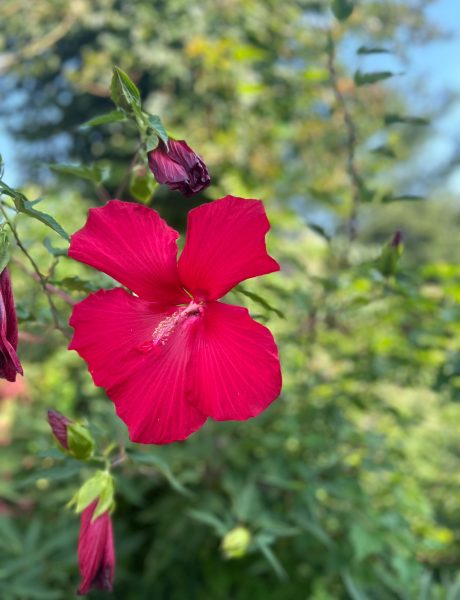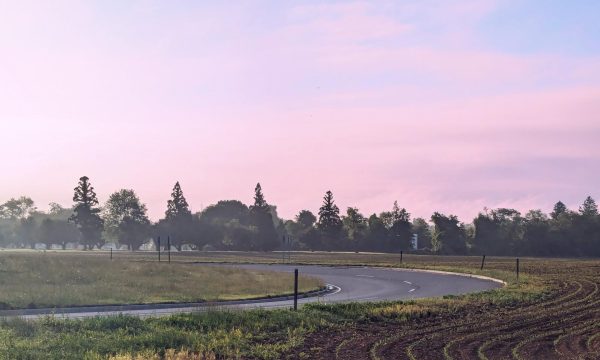Forbidden Clouds
The sky had been very angry lately, much different than the tranquil cerulean it had been a couple of hours prior. Putrid, hazy orange skies blotted with swollen clouds of rusty red, the forbidden color, as the ahaadeeth had preached. Mansoor, however, very much liked the color red; he thought it was wonderful, madahsh. But he knew better than to meddle with forbidden pursuits and ignore the ahaadeeth.
But the sky would remain very angry for hours, for days, for weeks even, and the sun would suffocate and stifle behind the orange haze and forbidden clouds. But he was never able to watch the spectacle unfold – Mansoor’s mother would scold him every time he did. And when he would ask why he was not allowed to watch the sky’s tantrum, he mother would snap and would hiss, “Akhrus, be quiet!” and would sit back down next to the window, cover her face with her hijab, and weep.
So Mansoor promptly sat on the floor, a good distance away from the window, because when Omi gave you an order, it was best to not disobey. So he closed his eyes as he sat, and listened to the sky hiss and crackle at its own accord. And for a brief moment, the incessant din of the sky ceased, and Omi lifted the hijab from over her face and turned towards her son.
“Ghadib,” she squeaked, “The sky is angry with us. It doesn’t like us.” Mansoor remained quiet. His mother muttered longingly under her breath, “Why, why, limadha, Allah yueayin,” recovered her face with the hijab, and returned to weeping.
Why would the sky be angry with us, he wondered. Mansoor’s father did have the job of fighting the sky, for Palestine. He had not yet returned, though the battle ended weeks ago. Maybe the sky hates my father, he thought. But Mansoor knew his father was a brave man, a true muharib, as they say. He heard the townspeople talk about the big black, heavy, metal birds that flew through the sky at night, raining fire upon his father and the other sky-fighters. But Mansoor knew in his heart that his father, an accomplished muharib, was fighting those birds still, and that he would arrive home, alive and well, and would teach Mansoor how the fight the sky one day so that Mansoor too could be as great a muharib shijae as he was.
Yet, the kids at school never saw eye to eye with Mansoor. They laughed when he spoke of the “sky being angry.” They jeered that all his theories were wrong, and that his brave father fought against “drones” (which to Mansoor sounded like nonsense and al’akhadib), not some “angry sky.” They laughed and laughed that Mansoor would never become a muharib. An older boy stood over Mansoor and spat at him, and said, “You imbecile, your father is mmayit; he’s gone!” The bullies teased him and threw around names: idiot, fool, takhir, manjun…but Mansoor did not react because he knew that a true muharib should control his temper. He let the judgment and ridicule fade to the background and buried his head into his tattered textbook. And his eyes picked up on a sentence at the bottom of the page: The more knowledge you have, the greater will be your fear of Allah. And this made Mansoor forlorn. He did not wish to fear Allah. He just wanted to know. He wanted to know why his mother wept. He wanted to know why his father hasn’t come home. He wanted to know what exactly made the sky so angry and ghadib.
As school ended that day, Mansoor straggled behind to avoid running into the older boys who all hated him. As he walked home on the dirt road, book in hand, he glanced up at the sky. It was blue, like the blessed water from the Yarmuk. The clouds were thin and white, like wisps of linen. But Mansoor felt indifferent. It was the same sky that took his father, and it could change so easily from that blessed blue to forbidden red. La a’ref, I just don’t understand the world anymore, he thought. So unpredictable, so awful, so much betrayal up above, fi alsamma’. Mansoor closed his eyes – from that point on he was the boy who was afraid of blue skies.





